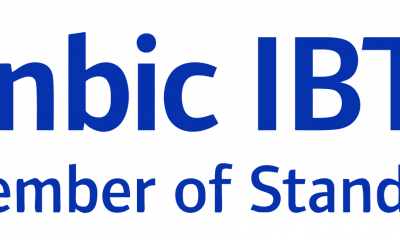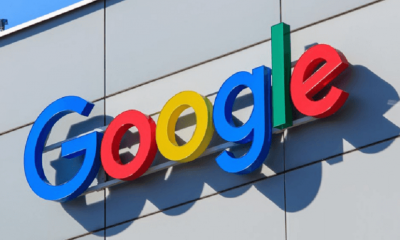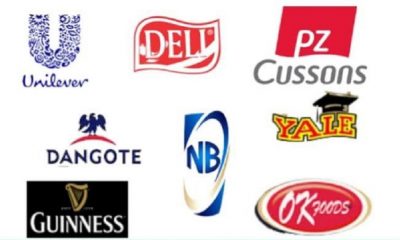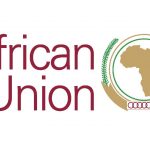Economy
The Currency Risk for Nigerian Businesses is Very Real – What Are the Best Ways to Handle It?
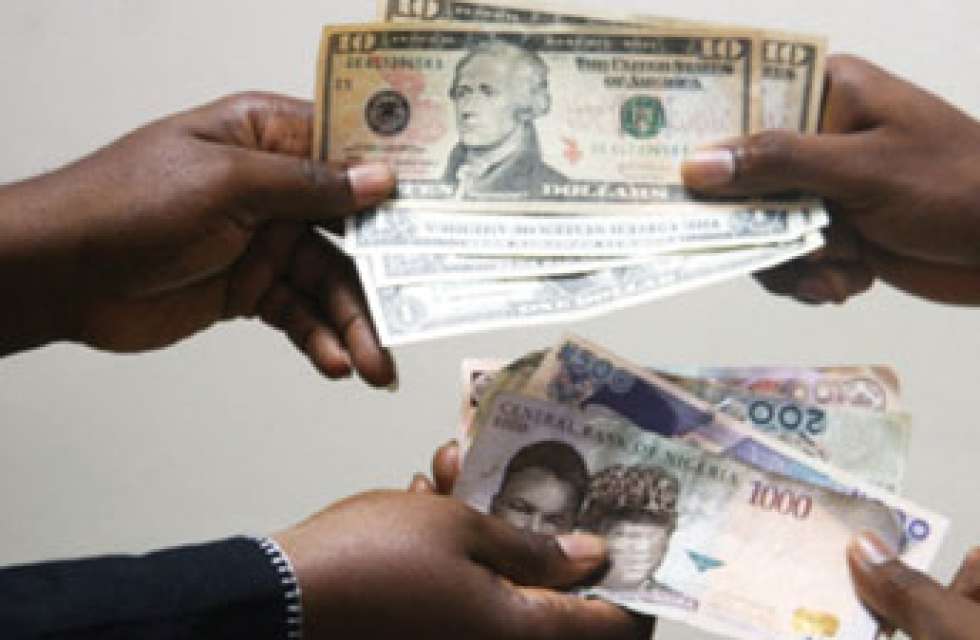
There is always some risk even in the most surefire business ideas – after all, nothing ventured, nothing gained right?
But businesses that operate by using different currencies for buying and selling, face uniquely pertinent risks from changes in the volatile currency markets – especially when dealing with a marginal currency like the Nigerian Naira.
In this post, we will take a close look at just what these risks are and how Nigerian businesses can best guard against them.
Despite experiencing some hardships since the oil crash of 2014, Nigeria is Africa’s largest economy by some distance and in many ways, it could be viewed as an African success story. The Lagos business districts are growing fast as young, entrepreneurial Nigerians form startups at a truly impressive rate, and ever more international businesses are now taking note.
As Nigeria begins to look outwardly across the continent and the globe, more and more domestic businesses find themselves transacting internationally either in buying or selling goods, or ordering or providing services.
Whilst doing business with the world offers huge opportunities, the challenges that come with transacting across borders in different currencies can be very intimidating for any business that relies on a currency as peripheral, and volatile as the Naira.
The Certainty of Change
Indeed, businesses that deal with clients or suppliers in other countries generally need the currency exchange rates to be very stable – fluctuations affect a transaction’s cost-effectiveness and can make all the difference between profit and loss.
For example, a Nigerian fashion house might buy its fabric from Senegal and then sell its finished goods domestically. If the Naira drops against the CEFA though, then the cost of importing fabrics will go up.
Whilst the firm can try to pass the difference and increase in costs onto the customers by charging more for the end product, many customers are more likely to find the goods to be overpriced. This can be disastrous for companies who are locked into contracts or simply rely heavily on a particular supplier as they can be pushed into running their once profitable business at a loss.
Businesses in the western world also face this dilemma too but currencies like the USD, EUR and GBP are generally pretty stable. As such whilst fluctuations can certainly hurt business, they are more often than not, possible to absorb.
However the Nigerian Naira has endured something of a torrid ride over the last 5 years; in 2017, $1 USD = N315 whereas the rate is currently $1 = N414! Trying to establish a medium to long term strategy for an international basis is very difficult when that business is built on a shaky foundation such as the Nigerian Naira.
The situation gets even more complex. Once again western business enjoys an advantage in the business foreign exchange field – there is a whole range of ways in which western businesses can guard against fluctuations in the currency markets that are unavailable to Nigerian business.
In particular, UK businesses enjoy a wide selection of Foreign Exchange possibilities on account of its gold-standard credit rating, libertarian financial services climate and highly trusted regulatory framework.
On the other hand, a lot of these ways are simply not available in Nigeria as a lot of the requisite service providers are either unwilling or unable to offer business in the country.
This is mostly owing to perceived currency and political stability issues mixed with an unfortunate reputation of Nigeria as an incubator of financial crime. Whilst Nigeria is not currently suffering from any US-imposed financial sanctions, it is feared that a change of regime could lead to this happening.
How to Hedge FX as an SME
There are 3 very common methods of currency hedging – ways in which businesses can indemnify themselves against changes in the currency market.
- Forward Contracts
Forward contracts are when a business agrees to buy a set amount of a given currency, over a specified time, at an agreed, settled rate. For example, a Nigerian business may anticipate that it will need to buy $10,000 over the coming year to pay suppliers. Rather than buy it incrementally as and when it is needed, a forward contract would allow them to “lock-in” the current exchange rate allowing them to budget the N4,111,600.00 they will need.
Forward contracts serve to protect a business from a drop in the value of their currency, but on the other hand, if the Naira was to increase against the dollar then the business would be losing out and paying more for the dollars. Forward contracts can be a bit of a gamble but they do provide certainty.
Problematically though, most of the companies dealing in forward contracts are not offering their services to clients in Nigeria. However, in September 2021, Nigeria did agree to a record $18 billion in OTC forward contracts so the outlook is at least improving.
- Currency Brokers & International Payment Providers
If a business is buying large amounts of a given currency, then a currency broker may be able to help them get a better exchange rate than the one generally available on the market. The issue Nigerian businesses face here though is simply that many currency brokers have a low appetite for buying Naira if they will deal with Nigerian business at all.
When making sizable international business payments (such as for an invoice) then an international transfer service provider can help a business save fees on international bank payments and may also be able to help them ensure a better rate. Unfortunately, though, international business payment service providers don’t accept any Nigerian business.
- Multi-Currency Accounts
Another very useful way for FX hedging is to open a multi-currency account. Multi-currency accounts allow a business to hold account balances in different currencies via sub-accounts or ‘pots’ in addition to their main balance. A Nigerian business could hold its main balance in Naira but then have a USD pot and a CEFA pot. The advantage is that they have foreign currency ready to use and are once again protected by the ebb and flows of the Naira.
Multi-currency accounts are very useful for companies that regularly deal in a small number of particular currencies.
Once again though, a lot of the international or borderless banks that offer multi-currency accounts don’t allow balances to be held in Naira and relatively few Nigerian banks allow multi-currency balances at all.
So, as we can see, all across the world, small businesses have dedicated service providers who are able to assist with FX management and payment. However, in Nigeria few, if any of these options are available.
How To DIY Hedge Against Currency Fluctuations
In the absence of a supportive financial service sector, Nigerian business owners have to utilise their talent for resourcefulness and look for ‘DIY’ hacks for currency hedging.
- Buy Cash Currency
Without access to either brokers or multi-currency accounts, Nigerian businesses are largely unable to hold balances in foreign currencies. They can, however, still hold cash in whatever currency they can get their hands on. Currencies like the USD, Euro and GBP are available worldwide and the CEFA can be obtained in many Nigerian money exchanges or by hopping over the border.
Therefore, when the exchange rate moves to a favourable position (i.e. the Naira becomes strong against the USD), a Nigerian business person can simply take advantage, buy USD cash and lock it securely away until it is needed. They can use it to make international payments via services such as Western Union or Ria or can simply sell it back when the rate changes in the other direction.
- Borderless Bank Accounts
There are an increasing number of fintech startups offering “borderless bank accounts” to residents of an increasing number of countries. These offer Nigerians an opportunity to get an international bank account in a foreign currency via the backdoor. However, few of them permit Nigerian citizens to hold accounts. Even Wise has stopped servicing Nigerian customers at least for now.
- Paypal
Whilst its fees and exchange rates are not the best, Paypal does allow Nigerians to hold accounts and will also permit them to hold USD balances if they receive funds in USD.
- Cryptocurrency
The cryptocurrency market is something of a wild frontier and as such, many platforms will accept customers from all over the world including Nigeria. Therefore a business could buy a given cryptocurrency and then hold it in their crypto-exchange until it was needed.
Whilst critics may point out that most cryptocurrencies are far more volatile than even the Naira, there are stable coins like the USDT which tracks the USD rate 1 for 1. Therefore, in buying USDT, a Nigerian business can almost hold a USD balance which can be converted back to fiat when they need to use it.
In Summary
From Lagos to London, international trade is both exciting and complex. However, Nigeria and the developing world, in general, do face some extra difficulties.
Still, whilst these difficulties can be restrictive they can be overcome or at least countenanced with some determination and ingenuity – and both of these are traits that Nigeria holds in abundance.
Economy
NASD Reiterates Commitment to Strategic Direction, Strong Governance
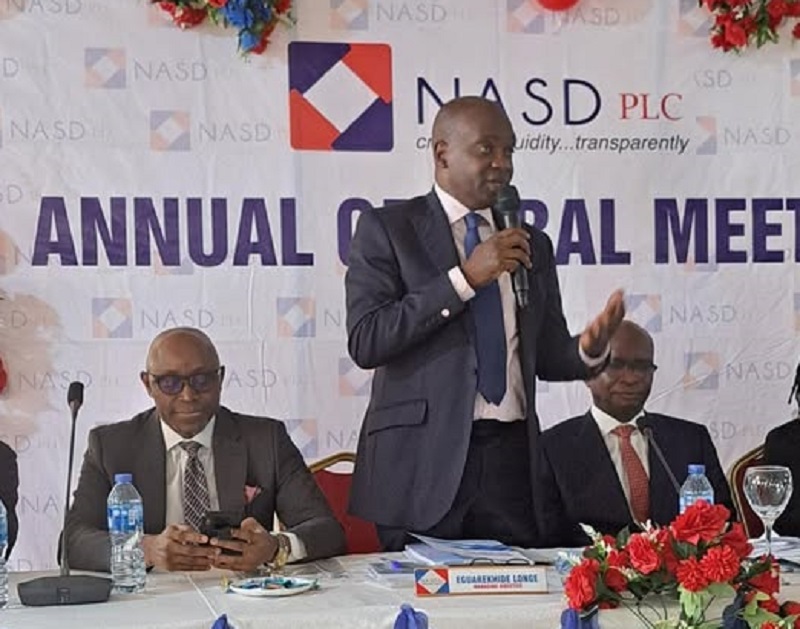
By Adedapo Adesanya
NASD Plc, which operates Nigeria’s Over-the-Counter (OTC) securities exchange, has reaffirmed its commitment to reinforcing its long-term strategic direction and governance framework.
The exchange recently convened its major shareholders, board members, and executive management at a high-level stakeholder retreat in Lagos.
NASD said, “The retreat held in Lagos brought together key institutional stakeholders for in-depth discussions on NASD’s evolving role within Nigeria’s capital market ecosystem.
“The engagement provided a structured platform for shareholders and management to align on strategic priorities necessary to deepen institutional strength, enhance market relevance, and support sustainable growth.”
The company noted that deliberations focused on the importance of strong shareholder collaboration, disciplined strategy execution, and equitable governance practices to further strengthen investor confidence and long-term value creation.
The statement added that participants exchanged views on navigating market complexity, adapting to regulatory and economic changes, and ensuring that the Exchange continues to operate in line with global best practices while addressing the specific needs of Nigeria’s over-the-counter market.
NASD emphasised that the retreat highlighted the critical role of close alignment among shareholders, the Board, and executive leadership in shaping the Exchange’s next phase of development. By encouraging open dialogue and shared strategic intent, the engagement reaffirmed NASD’s commitment to transparency, institutional resilience, and leadership within the capital market.
The session concluded with a group engagement reflecting the depth of experience, governance oversight, and collective responsibility guiding NASD’s strategic outlook as it continues to enhance its contribution to Nigeria’s financial market architecture.
NASD posted a standout performance in 2025, with its market diversification strategy delivering a surge in listings, deeper market activity, and a sharp expansion in market value across its alternative trading platforms.
Last year, the market capitalisation on the exchange more than doubled to N2.12 trillion, representing a 106 per cent increase from N1.03 trillion in 2024. The number of admitted securities also rose marginally to 47, up from 45 in the prior year, reflecting a 4 per cent growth.
The NASD Securities Index (NSI) rose by 18 per cent to 3,543.74 points, compared with 3,002.68 points in 2024. Similarly, the NASD Pension Index advanced by 21 per cent to 1,032.88 points, up from 954.33 points.
Trading volumes surged significantly during the year. Total volume traded climbed to 14.03 billion units, marking a 377 per cent increase from 2.98 billion units in 2024. However, this sharp rise in volume contrasted with a decline in transaction value, which fell by 43 per cent to N59.29 billion, down from N103.96 billion in 2024.
The total number of deals executed on the platform dropped to 6,456, representing a 26 per cent decline from 8,724 deals recorded the previous year, indicating fewer but larger or more strategic transactions.
The exchange also recorded notable listings in 2025, with Infrastructure Credit Guarantee Company PLC (InfraCredit), Paintcom Investment Nigeria PLC (Paintcom), and MRS PLC admitted to trading.
Economy
Customs Area 1 Command Generates N288.8bn to Beat 2025 Target by 33%

By Bon Peters
The Area 1 Command of the Nigeria Customs Service (NCS) in Port Harcourt, Rivers State, surpassed its 2025 revenue target by generating about N288.8 billion.
In the preceding financial year, the command generated N200.8 billion as revenue, indicating a year-on-year growth of 43.83 per cent.
Addressing journalists in Port Harcourt, the Customs Area 1 Controller, Comptroller Salamatu Atuluku, disclosed that the target for the command last year was N216.9 billion, indicating that this was surpassed by N71.8 billion or 33.1 per cent.
She attributed this achievement to the effectiveness of improved compliance monitoring, enhanced cargo examination processes, automation-driven controls, and sustained stakeholder sensitization.
According to her, the monthly revenue performance remained consistently strong throughout the year, with the highest collection recorded in October 2025 at N33.7 billion.
On export trade facilitation, she hinted that in line with the federal government’s economic diversification agenda, the command intensified efforts toward facilitating legitimate export trade, adding that within the year under review, it processed a total export volume of over a million metric tons, comprising both oil and non-oil commodities with a Free on Board (FOB) value of $463.6 million, which she said contributed meaningfully to Nigeria’s foreign exchange earnings.
In addition, Ms Atuluku stated that N838.02 million was paid as Nigeria Export Supervision Scheme (NESS) charges for both oil and non-oil exports during the year, noting that this reflected an increased exporter participation, improved documentation compliance, and the command’s deliberate efforts to streamline export procedures while ensuring adherence to extant regulations.
On anti-smuggling and enforcement activities, it was disclosed that the command sustained vigorous enforcement operations throughout 2025, deploying intelligence-led interventions, risk profiling, and routine cargo examinations to curb smuggling and protect national interests, resulting in the interception of undeclared pharmaceutical products at the NACHO shed.
The items intercepted included Progesterone 100mg/2ml, and Isifrane IP 250ml among others, discovered in three packages without the mandatory NAFDAC regulatory certification, contrary to import guidelines governing pharmaceutical products, the Controller stated.
In the year under review, the personnel of the command benefitted from periodic training programs, sensitization sessions, operational briefings, and system-focused engagements, particularly in areas of customs automation, risk management, enforcement procedures, and trade facilitation.
On infrastructural development, the command renovated the Quarter Guard, thereby enhancing access control, security coordination, and command presence at the main entry point, including the Command Staff Clinic which was renovated and upgraded to improve healthcare delivery and working conditions for medical personnel, and beneficiaries.
Also, the command executed a Corporate Social Responsibility (CSR) intervention on December 11, 2025, at the Model Primary School I and II, Orominike, D-Line, Port Harcourt, with the donation of customs-branded notebooks, school bags, and school uniforms, aimed at supporting basic education and easing the burden on pupils and parents within the host community.
Economy
FrieslandCampina, Okitipupa Trigger 0.64% Loss at NASD OTC Bourse
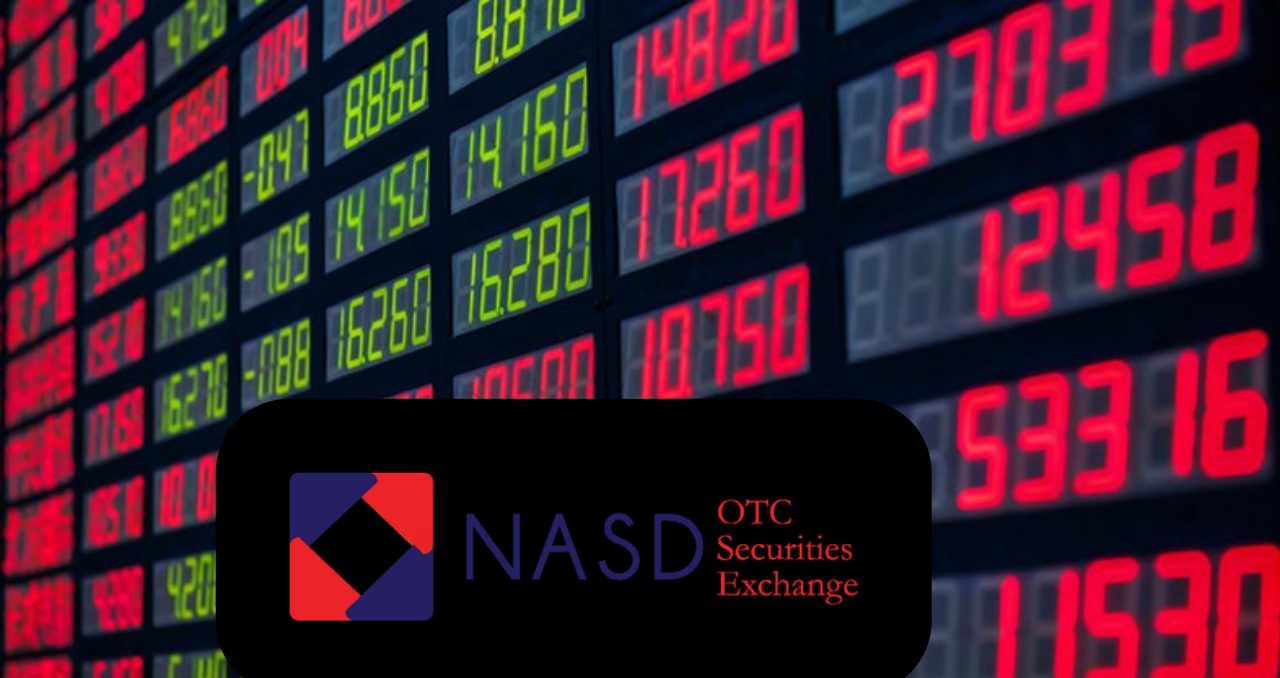
By Adedapo Adesanya
Five securities caused the NASD Over-the-Counter (OTC) Securities Exchange to experience a setback of 0.64 per cent on Monday, February 2.
During the first trading session of February 2026, FrieslandCampinaWamco Nigeria Plc shrank by N4.46 to end at N63.54 per unit versus the previous session’s N68.00 per unit, as Okitipupa Plc depreciated by N3.83 to close at N230.77 per share versus last Friday’s N234.60 per share.
Further, Central Securities Clearing System (CSCS) dropped 50 Kobo to sell at N40.00 per unit compared with the previous closing price of N40.50 per unit, UBN Property Plc dipped by 21 Kobo to N1.99 per share from N2.20 per share, and Acorn Petroleum Plc lost 3 Kobo to end at N1.35 per unit versus N1.38 per unit.
As a result, the market capitalisation went down by N13.98 billion to settle at N2.158 trillion, in contrast to the previous value of N2.171 trillion, and the NASD Unlisted Security Index (NSI) contracted by 23.35 points to settle at 3,606.76 points compared with last Friday’s closing value of 3,630.11 points.
Amid the loss, Geo-Fluids Plc managed to finish green after it chalked up 9 Kobo to sell at N6.84 per share versus the N5.75 per share it ended in the last trading day.
Yesterday, the volume of securities traded by investors surged by 1,238.5 per cent to 3.9 million units from 287,618 units, the value of securities increased by 1,075.2 per cent to N36.0 million from N3.1 million, and the number of deals soared by 90.5 per cent to 40 deals from 21 deals.
At the close of trades, CSCS Plc remained the most traded stock by value (year-to-date) with 15.4 million units valued at N623.9 million, followed by FrieslandCampina Wamco Nigeria Plc with 1.7 million units worth N110.2 million, and Geo-Fluids Plc with 10.6 million units sold for N69.9 million.
CSCS Plc was also the most active stock by volume (year-to-date) with 15.4 million units traded for N623.9 million, trailed by Geo-Fluids Plc with 10.6 million units worth N69.9 million, and Mass Telecom Innovation Plc with 10.1 million units transacted for N4.1 million.
-

 Feature/OPED6 years ago
Feature/OPED6 years agoDavos was Different this year
-
Travel/Tourism9 years ago
Lagos Seals Western Lodge Hotel In Ikorodu
-

 Showbiz3 years ago
Showbiz3 years agoEstranged Lover Releases Videos of Empress Njamah Bathing
-

 Banking8 years ago
Banking8 years agoSort Codes of GTBank Branches in Nigeria
-

 Economy3 years ago
Economy3 years agoSubsidy Removal: CNG at N130 Per Litre Cheaper Than Petrol—IPMAN
-

 Banking3 years ago
Banking3 years agoSort Codes of UBA Branches in Nigeria
-

 Banking3 years ago
Banking3 years agoFirst Bank Announces Planned Downtime
-

 Sports3 years ago
Sports3 years agoHighest Paid Nigerian Footballer – How Much Do Nigerian Footballers Earn


